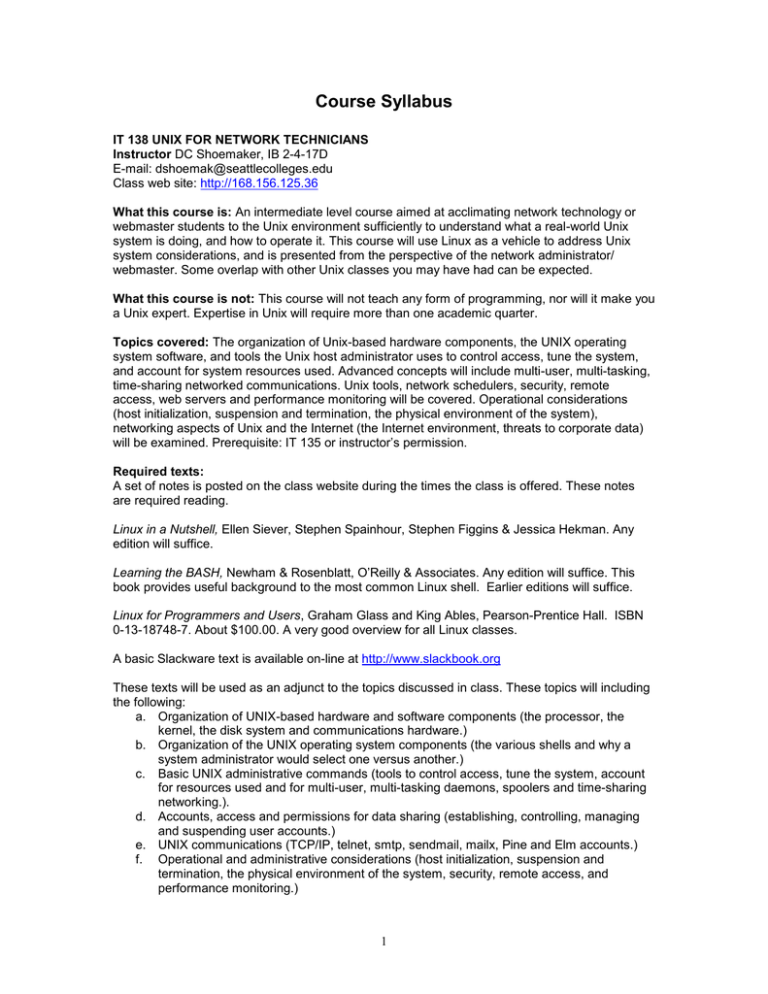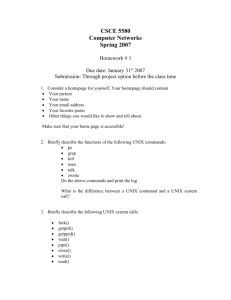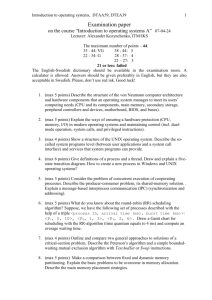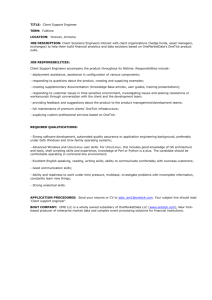
Course Syllabus
IT 138 UNIX FOR NETWORK TECHNICIANS
Instructor DC Shoemaker, IB 2-4-17D
E-mail: dshoemak@seattlecolleges.edu
Class web site: http://168.156.125.36
What this course is: An intermediate level course aimed at acclimating network technology or
webmaster students to the Unix environment sufficiently to understand what a real-world Unix
system is doing, and how to operate it. This course will use Linux as a vehicle to address Unix
system considerations, and is presented from the perspective of the network administrator/
webmaster. Some overlap with other Unix classes you may have had can be expected.
What this course is not: This course will not teach any form of programming, nor will it make you
a Unix expert. Expertise in Unix will require more than one academic quarter.
Topics covered: The organization of Unix-based hardware components, the UNIX operating
system software, and tools the Unix host administrator uses to control access, tune the system,
and account for system resources used. Advanced concepts will include multi-user, multi-tasking,
time-sharing networked communications. Unix tools, network schedulers, security, remote
access, web servers and performance monitoring will be covered. Operational considerations
(host initialization, suspension and termination, the physical environment of the system),
networking aspects of Unix and the Internet (the Internet environment, threats to corporate data)
will be examined. Prerequisite: IT 135 or instructor’s permission.
Required texts:
A set of notes is posted on the class website during the times the class is offered. These notes
are required reading.
Linux in a Nutshell, Ellen Siever, Stephen Spainhour, Stephen Figgins & Jessica Hekman. Any
edition will suffice.
Learning the BASH, Newham & Rosenblatt, O’Reilly & Associates. Any edition will suffice. This
book provides useful background to the most common Linux shell. Earlier editions will suffice.
Linux for Programmers and Users, Graham Glass and King Ables, Pearson-Prentice Hall. ISBN
0-13-18748-7. About $100.00. A very good overview for all Linux classes.
A basic Slackware text is available on-line at http://www.slackbook.org
These texts will be used as an adjunct to the topics discussed in class. These topics will including
the following:
a. Organization of UNIX-based hardware and software components (the processor, the
kernel, the disk system and communications hardware.)
b. Organization of the UNIX operating system components (the various shells and why a
system administrator would select one versus another.)
c. Basic UNIX administrative commands (tools to control access, tune the system, account
for resources used and for multi-user, multi-tasking daemons, spoolers and time-sharing
networking.).
d. Accounts, access and permissions for data sharing (establishing, controlling, managing
and suspending user accounts.)
e. UNIX communications (TCP/IP, telnet, smtp, sendmail, mailx, Pine and Elm accounts.)
f. Operational and administrative considerations (host initialization, suspension and
termination, the physical environment of the system, security, remote access, and
performance monitoring.)
1
g. Networking aspects of UNIX and the Internet (web servers, the Internet environment,
threats to corporate data.)
There will be two examinations and an unspecified number of quizzes and exercises to check
progress.
Grades will be assigned as follows:
60-70%
2.0-2.5
71-80%
2.5-3.0
81-90%
3.0-3.5
91%-100%
3.5-4.0
Comportment:
You are responsible for attendance. Punctuality is mandatory. Missed lecture and lab material
may be obtained from your class members. This class will discuss techniques that can, like any
knowledge, be used for ill as well as for good. Students are reminded that they are responsible for
their behavior; use of this information for illegal purposes is not acceptable, and will not be
condoned, on-campus or off. As this class is conducted partly in a lab environment, safety and
appropriate behavior will be stressed. Any behavior deemed by the instructor to be disruptive to
the class may be cause for dismissal under the provisions of the Student Code of Conduct.
Open Labs:
Open computer labs are available to students who have paid either the UT or CT fees. The
nearest is in IB 3 3-03 (PCs and Macs). This lab has the widest variety of software on campus and
is open for walk-ins. Hours vary each quarter; check in the lab for specific lab hours, or on the
campus IT Services pages at https://itservices.northseattle.edu/student-computing.
Internet Use:
It is the NSCC policy not to restrict student Internet access. It may be deemed disruptive behavior to view
Internet material offensive to those around them. Use of the Internet which is deemed by the instructor to be
disruptive behavior during lecture or labs, may lead to dismissal under the provisions of the Student Code
of Conduct.
I hope you enjoy this class. You should not find it overwhelming but you may become frustrated
from time to time. Please feel free to ask questions. It’s what I live for.
Possunt quia posse videntur
2



